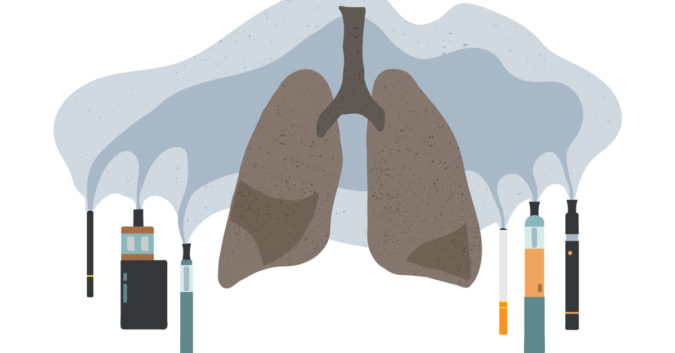The number of people who have suffered from a vaping-related lung illness has topped 2,500 nationwide, according to a report published by the Centers for Disease Control and Prevention (CDC). Hospitalized cases of the strange new disease have been confirmed in all 50 states, plus the District of Columbia and 2 U.S. territories. Furthermore, 55 people in 27 states have died.
Hospitalizations from the vaping illness peaked in September, but they remain an ongoing concern, with states reporting new cases of the disease on a weekly basis.
The CDC also confirmed last week that an additive used in many THC-containing e-cigarettes and vape products appears to be the root cause of the disease, which the CDC is calling EVALI (short for “e-cigarette, or vaping, product use-associated lung injury”). The chemical, vitamin E acetate, is often used as a thickening agent in vape cartridges that contain THC — the active ingredient in marijuana.
Likely Culprit of Vaping Illnesses and Deaths Detected
Dr. Anne Schuchat, the CDC’s principal deputy director, told NPR cases of EVALI suddenly spiked in June 2019. The sudden increase helped researchers identify vitamin E acetate as the problem chemical. It is still not clear, however, how exactly the substance injures lung tissue, nor is it certain that vitamin E acetate is the sole compound responsible for the outbreak.
"That doesn't mean that there aren't other chemicals that can or are causing lung injury," Schuchat told reporters.
While marijuana and THC-containing products remain illegal at the federal level, 11 states have fully legalized it for recreational use. Another 33 states allow the medical use of cannabis. This legal gray area has allowed for the manufacture of some fairly sophisticated ways for ingesting THC while shielding those same processes from regulatory oversight. Experts believe this confusion is partly responsible for the proliferation of compounds that a legal, regulated industry would forbid.
“The black market can only be addressed by a viable legal market that’s regulated and can promise safety and security for consumers,” Terry Holt, spokesperson for the National Cannabis Roundtable, told The Hill.
Is the Black Market to Blame?
While the CDC has said that most cases of EVALI stem from “informal sources” like friends, family, or black-market traders, it could not rule out the possibility of “tainted” e-cigarettes finding their way into state dispensaries. As the CDC’s Schuchat told The Hill in November, “States that have dispensaries set their own regulatory measures,” which makes it difficult for the federal government to track ingredients.
For those reasons, both the CDC and the U.S. Food and Drug Administration (FDA) are advising people to abstain from using e-cigarettes that contain THC — at least until researchers have a fuller understanding of what causes EVALI and why.
Currently, researchers can trace a gradual decline in EVALI cases since September to a couple of causes: One, a nationwide crackdown on youth vaping, including all-out bans in states like Massachusetts; and two, fears regarding the use of THC-containing e-cigarettes.
Teen Vaping Epidemic
Dr. Nora Volkow, director of the National Institute on Drug Abuse (NIDA), told CNN she is optimistic that these trends will lead to a decline in overall youth vaping:
"We predict that next year that awareness that vaping of THC is associated with these acute lung injuries may lead to actually a reduction of vaping among teenagers.”
CDC data shows the use of e-cigarettes among high schoolers in the U.S. skyrocketed from 1.5% in 2011 to 20.8% in 2018. That’s roughly 1 in 5 high schoolers.
While THC vaping may seem common among teenagers, most teens remain hooked on nicotine e-cigarettes, particularly those with mint, menthol, or fruit flavorings. One FDA survey found more than 96% of teens in the U.S. started vaping with flavored e-cigarettes. This trend is behind what some health experts are calling an “epidemic.”
Others blame brands like JUUL for fueling the wave through marketing campaigns that specifically targeted kids. That criticism has led to a shakeup at JUUL, with new management, a hiring freeze, and an ongoing investigation by the Federal Trade Commission (FTC).
Recently, U.S. Surgeon General Jerome Adams officially declared youth e-cigarette use “an epidemic in the United States.” In a news conference, Adams told reporters, “Now is the time to take action. We need to protect our young people from all tobacco products, including e-cigarettes.”
